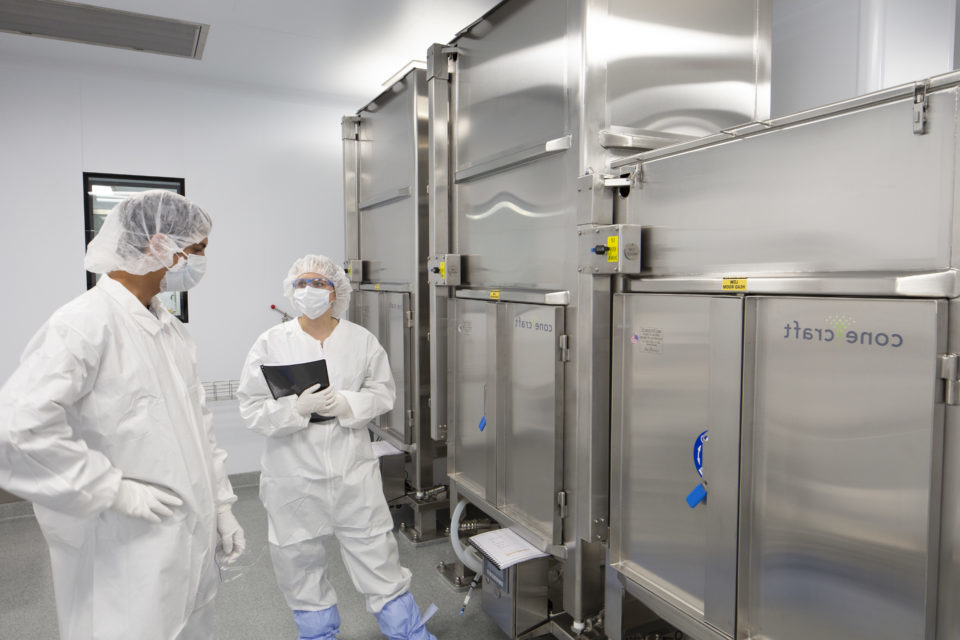With Trista Hager, Vice President, Sales, AES Clean Technology
The design, development and installation of a cleanroom are integral to the successful production of innovative therapeutics with the potential to change patients’ lives. The chosen cleanroom vendor can make or break the accelerated delivery of new medicines to patients, with therapeutics needing facilities with a controlled environment to ensure safety and sterility. As a result, carefully assessing whether a potential partner has the capabilities, expertise and strategies required to support your project’s needs is of critical importance.
In the first part of our “Top 10 Questions” series, we outline the first five key questions that you should plan to ask your future cleanroom partners to ascertain whether they have what it takes to support your next project:
#1: Will the cleanroom vendor be able to meet the unique needs of your project?
To ensure your selected partner has the capabilities, expertise and infrastructure required to support your project, it is important to determine whether it has significant prior experience in successfully delivering projects of similar size, type and location. Potential vendors should be communicative, providing references and case study examples, as well as the opportunity to visit the manufacturing site to allow you to ask questions.
Additionally, cleanroom vendors should encourage open dialogues to determine the user requirements of the project, making sure all parties are aligned on scope, materials to be used in construction, and execution. With all involved having a thorough understanding of these factors and terms, you can ensure deliverables match the pre-established agreement.
#2: Is the cleanroom vendor in a position to deliver the project?
Understanding how and when a project will be completed is critical to ensuring the anticipated timeline can and will be met. As a result, it is vital to ascertain whether the potential cleanroom vendor is financially stable and able to deliver the project. As cleanroom design, development and installation facilities require large investments to manufacture, financial checks should be carried out to ensure the contractor can meet the task.
#3: In what ways does the cleanroom vendor offer flexibility?
As facilities tend to evolve and processes change, flexibility is key in cleanroom design, manufacturing and installation to meet the operational needs of the facility both now and in the future. It is important to determine if the selected vendor can make rapid adaptations during design, fabrication and installation to keep your project on time and your performance objectives as their top priority. Vendors that leverage pre-engineered modular installation can provide this flexibility, reconfiguring components quickly to address changes such as evolving processes, updated business drivers or equipment arriving late, minimizing downtime in the future.
Offering customizability in cleanroom design, manufacturing and installation is a key aspect a potential vendor partner must also provide to meet the specific needs of a particular process. With modular execution and set designs that are customizable in nature, biopharma and pharma organizations can gain speed in delivery and secure predictable costs while having the option to make tailored changes to fit their needs.
#4: What strategies does the cleanroom vendor use to deliver projects at speed?
The faster a cleanroom facility is up and running, the sooner critical medicines can be delivered to the patients who need them. Employing prefabricated cleanroom methods with onsite installation can not only build facilities faster than when using traditional stick-built approaches but also speed up validation. Prefabrication can also allow for customization without derailing timelines. By offering a standardized and set modular design that enables manufacturing and installation to start without the need for further engineering or design, cleanroom vendors can help to significantly accelerate projects.
#5: How does the cleanroom vendor ensure quality?
The integrated details of the cleanroom, such as operational components, should be produced using high-quality materials. With modular installation, cleanroom systems can provide controlled conditions on the manufacturing floor to deliver predictable, repeatable and high-quality results.
This ensures that quality is not only built into the projects but also into their execution methods. An integrated commissioning plan can assist in verifying the quality and documenting all aspects of the project’s life cycle, including installation and operational verification. This can also be used to help accelerate the validation of the facility at a later stage.
Partnering with a specialized cleanroom expert
As the only US-based cleanroom company that self-performs the design, manufacture and installation of cGMP modular cleanroom facilities, AES works to ensure your project is built on time and within budget. Leveraging our expertise in cleanroom solutions combined with our focus on your project’s success, we can provide a cleanroom to meet your needs now and in the future.
Go to part 2 of this series to discover the remaining five questions for your potential cleanroom expert.
To discuss these questions with AES and learn more about how we can support your next modular cleanroom project, contact us today.

